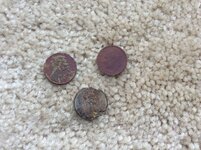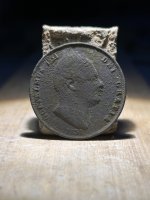OcdChaos
Jr. Member
- Dec 29, 2016
- 87
- 146
- Detector(s) used
- Tesoro Vaquero, Garrett AT Max
- Primary Interest:
- All Treasure Hunting
I'm new to the hobby, and was wondering if anyone could point me to a website link or article that discusses the impact of soil degradation over time on different types of metals in coins. I see where people can dig up hundreds of year old coins that look nice, as opposed to one my first digs at a park yesterday where I find a newer penny that the edges were corroded away, like eaten by acid. Just looking for an article or something that talks about the metals in coins and what may hold up over time and what doesn't, and what factors may affect coin condition in soil. Attached is a photos of a few coins I found yesterday as an example. Thanks.







